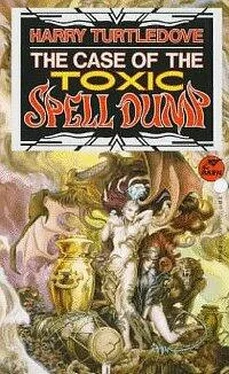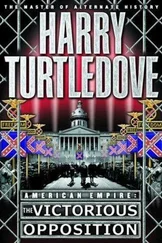“Okay,” Sudakis said again. “I am directed by our legal staff to provide no more cooperation than what the order demands. That means that if you need to take a leak, you’ve got to do it across the street. You can’t come into the containment area for anything.” He gave me an apologetic shrug.
“I’m sorry, Dave, but that’s what my orders are.”
“Since we’ll be sniffing around your wall, maybe I’ll just stand up against it if I need to whizz,” I told him. He gave me a funny look; bureaucrats aren’t supposed to talk like that.
Michael Manstein said, “I’m going to get to work now.” He opened up his little black bag and started taking things out of it Sudakis watched him setting up. I watched Sudakis. After a minute or so, I said, “Walk around the comer with me, Tony.”
“Why? You gonna whizz on my shoes?” But he walked around the comer with me.
As soon as we were out of sight of Michael—and, more to the point, the security guard—I gestured as if I were pulling out an amulet. Tony Sudakis might be a bruiser, but don’t ever think he’s dumb. He went through his little pagan ritual with the chunk of amber he wore in place of a crucifix.
When he nodded to me, I said, “Okay, we can’t go inside the dump. I understand your position. But I still want to ask you about something I saw, or thought I saw, when I was in there before. I’d have done it sooner, but I keep forgetting.”
“What is it?” His voice was absolutely neutral; I couldn’t tell whether he wanted to help, was angry at me, curious, or anything. He just set the words out in front of him as if they’d been printed on parchment.
I described as best I could the Nothing I’d seen in the dump, the way, just for an instant, the containment wall seemed to recede to an infinite distance from my eyes. “Did you ever notice anything like that?” I asked him. “It was—unnerving.”
“Sounds that way,” he agreed, and now he let life creep back into his words. He shook his big fair head. “Nope, can’t say I ever did see anything of that sort.” He quickly raised a hand. “Don’t get me wrong, Dave—I believe you. You spend as much time as I have inside that containment area and you’ll see all lands of strange things. Like I said before, you get all those toxic bits of not-quite-spent sorcery reacting with each other and you will see funny things. You’d better believe you will. But that particular one, no. Sorry.”
“Okay, thanks anyhow.” I didn’t know whether to believe him or not; as usual, he was hard to get a spell on. I wondered if it was because he worshiped Perkunas. In a mostly Judeo-Christian country (and the same goes for Muslim lands, too), followers of other Powers often seem difficult to fathom. On the other hand, Tony probably would have been tricky if he’d been a Catholic, too.
“Anything else—anything else short—you want to talk about while the charm’s still on?” he asked.
I shook my head. We went back around the comer to the containment area entrance. The security guard looked moderately entranced himself, watching Michael set up. Tony Sudakis didn’t give Manstein even a glance; he positioned the footbridge, motioned for the guard to pick it up again, and marched in toward his office.
Maybe working in the toxic spell dump for so long had dulled Tony’s sense of wonder. Lots of strange things undoubtedly happened in there, most of the sort you wouldn’t want to see outside a stout sorcerous barrier. But for me—and evidently for the security guard, too—nothing is more interesting than watching a skilled thaumaturgical craftsman at work. And Michael Manstein is one of the best If you’re looking merely to detect the presence of most substances and Powers, you don’t need fancy sorcery. Suppose you want to find out if someone’s spilled sugar under a rug, for instance. Get out some sugar of your own and apply the law of similarity. If you get a reaction in your control bowl, it was sugar under the rug all along (ants everywhere are a good due, too).
But if you’re trying to see whether the influence of, say, Beelzebub is leaking out of a toxic spell dump, you don’t go about summoning up Beelzebub to see if the law of similarity applies—not if you’re in your right mind, you don’t, anyhow. Byproducts from spells that invoke Beelzebub are contained within warded dumps for good reason: you don’t want them getting out into the environment And if you summon the Lord of the Flies outside the containment area, that’s just what’s going to happen.
And so Michael Manstein attacked the problem indirectly.
I mention Beelzebub because that’s Whose influence he was checking for when Tony Sudakis and I came back from our sub rosa (or should I say sub sucino?) chat Instead of even thinking about invoking the demon, he pulled out a jar full of every thaumaturge’s friend, the good old common fruit fly.
Because fruit flies are very simple—and very stupid—creatures, they’re exceptionally sensitive to mage.
Apprentices practice spells with them; if you can’t make your charms work on fruit flies, you’re better off in another line of work.
And when that magic has anything to do with Beelzebub, of course, their sensitivity increases even more. Just by watching the way they flew from the jar, Michael could tell whether the demon’s influence had leaked out where it didn’t belong. It was as elegant and low-risk a test as you could imagine.
Since I’m not a mage myself, to me that just looked like little brownish flies coming out of a bottle. When Michael screwed the lid back on, I figured I could safely interrupt him, so I asked, “Any skin of Beelzebub?”
“None apparent to me,” he answered. The Lord of the Flies is renowned for his trickery, but I do not believe him capable of evading the fruit-fly test; it draws them even more strongly than spoiled plums.”
“Good to hear,” I said, “because I know there are spell byproducts with his influence on them inside the dump.”
“Yes, that is to a certain degree reassuring,” Michael agreed. “If a Power so corrosive as Beelzebub cannot break free of the containment area, that augues well for its chances of holding in other, less aggressive, toxic spells.”
“Who after Beelzebub?” I asked.
“I had thought Huitzilopochtli,” he answered. “He is at least as dangerous as Beelzebub, and we have seen through the case of that wretched curandero’s nostrum that he is active—and seeking to become more active—in the Angels City area.”
Again, he didn’t try to invoke the Aztedan war god: after all, we were doing everything we could to keep Huitzilopochtli from manifesting himself around Angels City. Instead, he performed another indirect test, this one using flayed human skin substitute. It looked like parchment, but it made my flesh creep all the same.
Michael chanted hi a clucking, gobbling language. It wasn’t Poultry; it was Nahuad. Spainish is the dominant tongue in Aztecia today, but many people still use Nahuad in their day-to-day lives, and it’s as much the language of the native Powers as Arabic is forjinni. I hadn’t known Michael knew it, but I wouldn’t bet against Michael’s knowing any particular tiling.
The chant ended. Michael looked down at the square of flayed human skin substitute. It seemed just the same as it had when he took it out of his bag. He grunted softly.
“What’s the matter?” I asked.
“I would have expected to observe some reaction there,” he answered. “Huitzilopochtlic contamination is as likely an inducer of apsychia as any I can think of. But there appears to be no external seepage, at least not as measured by this test.”
“What were you expecting to see?” I asked.
“The influence of Huitzilopochtli was brought into the Devonshire toxic spell containment area by means of flayed human skin substitute. Had that influence spread beyond the containment area, the sheet of the substitute material I have here would have demonstrated it by beginning to bleed.”
Читать дальше












